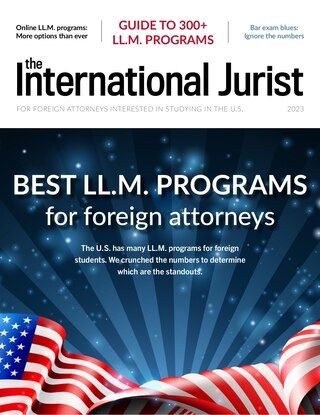By Desiree Jaeger-Fine
In the last four years that I have worked with international attorneys, many of whom are LL.M. students, I have rarely, if ever, heard anything positive from them about career services offices. Over and over again, I hear the complaint that law school career services offices are not doing anything for their LL.M. student body.
In my lectures and articles, I am torn between saying things for which others will love me but that I don’t believe in, and things for which others will very much dislike me but that I believe will be helpful.
Many LL.M. students want to hear me say something like this:
“I understand your difficult situation and agree that your law school lured you to the U.S. with the promise of making it big here only to take your $45,000 and then, once you are here, drop you like a hot potato. I agree that U.S. employers do not get the true value of hiring international professionals, and that they should stop focusing on J.D. graduates because they rarely have the experience we international attorneys have. We should unite to educate law schools and employers about the true value of hiring international attorneys.“
If I were to start my article or lecture with this, I would surely win the heart of every LL.M. student. But will that help them? Absolutely not!
I choose to say things that I truly believe will help my clients and audience because that is, after all, my job as a career consultant — to advise about the current market and the best ways to move within it. Whether they like me or not is not my concern. Here is what I truly believe about the refrain that “law schools are not helping LL.M. students in their job search:” Stop complaining and get to work!
I utterly disagree that law schools, especially career services offices, are not doing their best for LL.M. students. To the contrary, I speak to many law schools over the course of the year and see the effort that takes place behind closed doors to assist LL.M. students in becoming successful in the U.S. So why is there such a gap between career services and LL.M. students? The reason for this is mistaken expectations. LL.M. students misunderstand what “help with their job search” means and, therefore, expect career services professionals to do something altogether different than what they do.
“Wouldn’t it be wonderful to walk into career services and tell the friendly adviser that we are seeking employment in banking and finance in New York? The friendly adviser then cracks open the “LL.M. Employment Database,” a database secretly accessible only by law school career services offices, goes to the banking and finance section, shows us eight different employers from which we can chose the one we like best. She then calls that employer and closes the deal.”
That shouldn’t be too much to ask for, shouldn’t it? It is, and it’s completely unrealistic.
There is no such thing as an employer that hires LL.M. graduates. If I would get a dollar for every time someone asks me for this magic list, I would be drinking fruity little cocktails in the Bahamas. If you find such a list online, all it would tell you is that, in the past, these employers have hired an LL.M. graduate. But this does not mean that they were hired because of that LL.M. degree. Employers hire employees who have the skills that a particular position requires. Only, and only if these skills are present in an international lawyer, will they consider the hire. And what’s even more important, only if these skills are unique to an international attorney will they consider hiring an international attorney. If a domestic attorney possesses equal skills, an assessment of other factors may call for the hire of the domestic attorney. Why? Because the international attorney comes with too much baggage. Why hire an LL.M. in need of an H-1B visa, who may decide to move to his or her home country within two years?
An employer can only justify taking the risk associated with the hire of an international attorney if she possesses a skill a domestic attorney does not have AND that is needed for the particular position.
An LL.M. degree may be one of the skill requirements, but quite frankly, it rarely is. I have never heard that someone got a job offer because her LL.M. was better than someone else’s J.D. If someone was hired despite the missing J.D. it is because an international attorney’s skillset was needed.
These opportunities exist, but they are rare. The job of career advisers is to assist you in identifying these job opportunities, preparing quality applications, preparing for interviews and encouraging you to network. Their job is not to be your secretary.
Our job as LL.M. students and graduates is to take that advice and execute it. No one else can network or go to an interview for us. If we are not willing to take on that responsibility only to blame the market and law schools for our situation we show only one thing: We do not have what it takes.
Hiring is a business decision. The undefined potential, both in regards to point in time and actual value, has to be balanced with the real risks associated with an H-1B sponsor and the fact that a foreign LL.M. is not settled in the States and may return to his home country. The risk outweighs the potential. The risk of a J.D. hire is smaller and the potential of a J.D. graduate, who clerked in federal court, worked on a law journal, has 3.9 GPA and was the captain of the college football team, is much more calculable. And if the position requires 95% percent domestic work, who would you hire?
We, law schools and career consultants, all want to help you. My professional success as a career consultant for international attorneys is closely intertwined with the success of my LL.M. clients. I not only want you to get a job, I need you to get a job, otherwise I fail and my company will, too. The success of law schools is just as intertwined with the success of their students. The only way we can help you is by guiding you along the way. Listen to career services professionals — they have been doing this for many years and know what they are talking about. At the end of the day, it is your decision whether or not you execute their sound advice.
Desiree Jaeger-Fine is principal of Jaeger-Fine Consulting, LLC, a career management firm for international attorneys in New York, and author of the forthcoming “A Short & Happy Guide to Networking” (West Academic Publishing).






